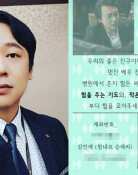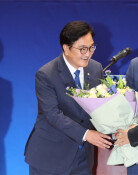[Opinion] Worn-out Ministers
Cheong Wa Dae explained on August 7 during after announcing its cabinet reshuffle that the Minister of Labor Lee Sang-soo was not subject to replacement because, [He] was very enthusiastic about performing his job. His ambition to continue his term until February 9, which was a date that did not hinder his National Assembly election appearance next year according to the electoral law, was conveniently presented as his enthusiastic wish to continue the job. However, Minister Lee recently said, I will play a role in the presidential election this year, and that I will resign by early November at the latest. Curiosity mounts as to what that role in the election can be since he resigned only three months earlier than previously announced.
Minister Lee contributed to President Roh Moo-hyuns election by illegally collecting contributions worth approximately 3.2 billion won during the last presidential election. He was arrested for this, and was detained in prison for five months until he was released on probation. His appointment as minister was a representative case of patronage, along with the case of Unification Minister Lee Jae-jeong, who was also arrested for illegal fund raising during the previous election. Lees claims of being a labor expert do not seem to back his actual performance. He participated an irregular employment forum on 11 October, only to be indignantly detained, which casts doubt on his words, Current labor issues seem to be closing, which is why I will resign.
There is a saying Personnel affairs are everything, signifying the importance and delicacy of personnel management. Most past administrations have failed to receive a passing grade on personnel management, but this administration is surely the only one that massively produced egregious ministers. There was the case of former Environment Minister Lee Chi-beom who carelessly resigned in order to join the presidential candidate camp. Dedicated government workers would not feel terribly motivated by seeing such scenes.
President Roh newly installed the office of presidential aide for personnel affairs in order to appoint the right person at the right place through a three-phase system of recommendation, verification, and adjustment. The presidential aide for personnel affairs recommended while the presidential aide for civil affairs verified. However, this system of personnel management was only talk. The recommendation criteria were code-based, spoils-oriented, resume-fillers, and election-losing compensations, and in such cases, verification was superficial. The minister of Education and Human Resources Development was replaced five times, with an average term of 8.2 months.
Kwon Sun-taek, Editorial Writer, maypole@donga.com







